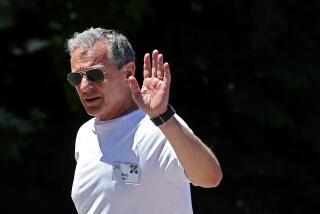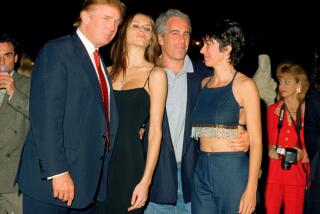CEO of Morgan Stanley to Resign
- Share via
NEW YORK — Morgan Stanley Chairman and Chief Executive Philip J. Purcell succumbed Monday to a months-long effort to oust him, saying he would step down to prevent more damage to the venerable investment bank.
Purcell has been locked in a bruising showdown with former Morgan executives who blame him for the company’s lackluster earnings and weak stock price. The unusually public tussle riveted Wall Street but rattled the company as a wave of high-level executives defected to competitors.
Morgan also announced that second-quarter earnings would sag 15% to 20% below the year-earlier levels amid a troubled securities-trading environment.
Purcell initially tried to insulate himself by promoting loyal underlings and firming up his support on the board. But the continued exodus of securities traders and investment bankers bred a public relations firestorm and spawned doubt about whether Morgan could maintain its perch among Wall Street’s preeminent firms.
“Way too much attention is being paid to acrimony and criticism, most of it directed at me,” Purcell said in a conference call with analysts and the media. “It’s not good for Morgan Stanley, so the best thing for me to do is, in fact, to retire.”
Miles Marsh, the board’s lead director, acknowledged the effect of the public furor on Morgan directors.
“In the last week, Phil came to us with the conclusion that he should remove himself for things to settle down,” Marsh said in a meeting with employees. “We obviously had been thinking about it ourselves and regretfully had to accept his conclusion.”
Purcell said he would resign as chief executive as soon as a successor was named.
Morgan shares rose 2% on the news, finishing up $1 at $50.88 -- still well below its 52-week closing high of $60.32 on Feb. 11.
The board announced that it had launched a search for a replacement, but that provoked new controversy as the head of the search committee said the board would not consider former Morgan executives who Purcell purged in the last three months.
“I’d be a little happier if they said they hadn’t totally ruled them out,” said Jim Schmidt, manager of the John Hancock Financial Industries fund.
Wall Street is looking to see whether Morgan will shed the troubled units that sparked Purcell’s resignation and whether the firm will be able to remain independent.
Morgan’s disappointing financial performance, combined with the lame-duck status of its CEO, might attract interest from potential suitors. Longer term, there are questions about whether Morgan can compete with larger rivals, such as Citigroup Inc., which have broader businesses including commercial banks.
The seeds of Purcell’s troubles were planted in 1997 in what seemed at the time to be the capstone of his career: the historic combining of his Dean Witter, Discover & Co. brokerage with investment bank Morgan Stanley Group Inc. Purcell was CEO of Dean Witter.
The melding was premised on the notion that Dean Witter brokerage customers would provide a ready audience for Morgan Stanley stock offerings and mutual funds. Also, Dean Witter’s businesses were considered to be less vulnerable to the vicissitudes of the market.
But there were a variety of problems, including a stark culture clash. Morgan was one of Wall Street’s blueblood firms, but Dean Witter was a middlebrow brokerage that once peddled stocks in Sears, Roebuck & Co. department stores.
The division stemmed partly from Purcell’s shrewd outflanking of his Morgan counterparts for control of the new company. He squeezed out former Morgan President John J. Mack in 2001.
The tension was temporarily salved by the lucrative 1990s bull market. But the fissure widened recently as the core of the former Dean Witter, including the brokerage and credit card divisions, weakened while the investment-banking unit that was the heart of the old Morgan shined.
Critics said Purcell did not move aggressively or resourcefully enough to correct the problems in the Dean Witter units.
“It’s been enough years that whatever they’ve been doing hasn’t been working,” said Anton Schutz, manager of the Burnham Financial Services fund.
The first salvo came late last year when a manager of a hedge fund called on Morgan to shed the brokerage and credit card units. That was followed by the furious effort by former Morgan executives -- dubbed the Group of Eight -- to force out Purcell. They took out newspaper ads excoriating his leadership and urged institutional investors to lobby Morgan’s board for his removal.
“As shareholders of Morgan Stanley, we are pleased that the board has taken this important and necessary first step,” the dissidents said in a statement Monday. “We hope that this and future actions will stem the recent tide of departures from the firm and restore a culture and business environment capable of attracting and retaining the best professional talent to Morgan Stanley.”
More to Read
Inside the business of entertainment
The Wide Shot brings you news, analysis and insights on everything from streaming wars to production — and what it all means for the future.
You may occasionally receive promotional content from the Los Angeles Times.










